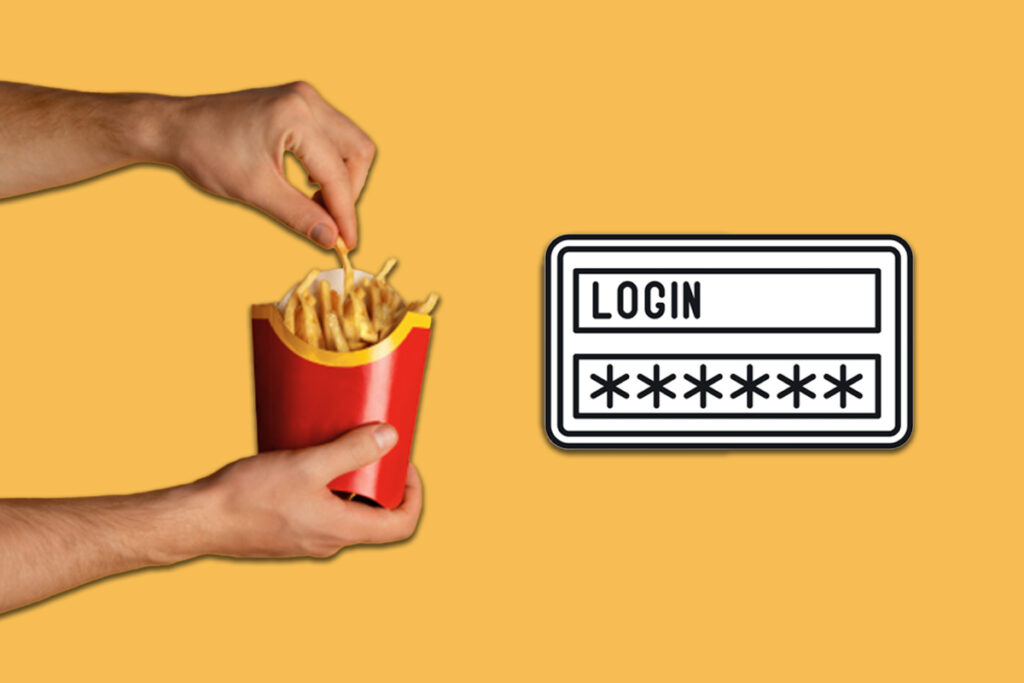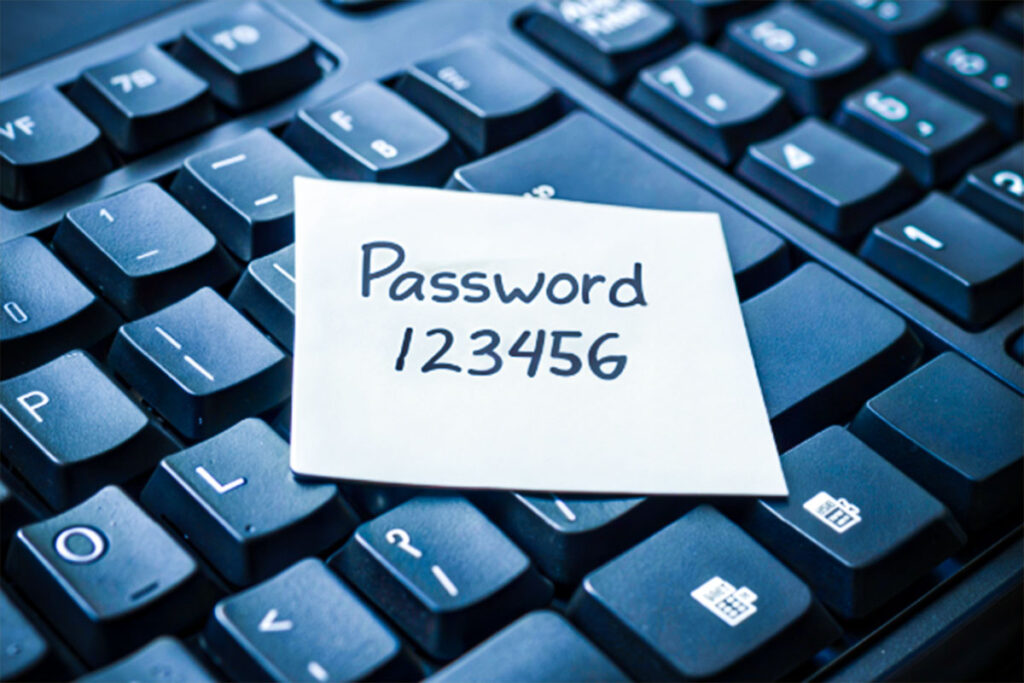In June 2025, one of the world’s most recognisable brands, McDonald’s, became the subject of widespread cybersecurity scrutiny. The issue wasn’t due to a sophisticated hacking operation. It wasn’t even a zero-day exploit.

It was far simpler, and far more alarming.
The McDonald’s password was “123456”.
Yes, you read that correctly. McDonald’s, a global icon in the fast-food industry, and a brand that is recognised worldwide, protected valuable information provided by potential employees with a password of “123456”.
This was not just a tech failure. It was no hackers or cybercriminals forcing their way into the data. It was a breakdown in basic cybersecurity hygiene, and one that serves as a warning to every business, no matter its size. At Adept IT Solutions, we work with businesses across Newcastle, The Hunter Region, Sydney and beyond, to help prevent these kinds of incidents. The McDonald’s password breach is a reminder that strong cybersecurity doesn’t begin with advanced firewalls or AI, it starts with getting the basics right.
What Happened with the McDonald’s Password Breach?
Security researchers discovered that McDonald’s AI hiring platform, “McHire”, built by third-party vendor Paradox.ai, had an active admin login using the credentials “123456” as both the username and the password. Within half an hour, the researchers gained full access to sensitive applicant data, including names, emails, phone numbers, and even home addresses. In total, over 64 million job seekers were potentially exposed due to the McDonald’s password security, or lack thereof.
The researchers who discovered the issue were not cybercriminals, they were professionals, testing publicly available systems. They quickly found that the admin login for McHire.com had not been secured beyond the factory default credentials. What made the situation worse was the lack of multi-factor authentication (MFA), which could have stopped unauthorised access even if the credentials had been compromised.
Once logged in, the researchers uncovered a massive volume of data collected through McDonald’s chatbot, “Olivia,” which handles initial job application conversations. The platform also suffered from an Insecure Direct Object Reference (IDOR) vulnerability, this allowed users to modify the URL and access other applicants’ data by simply changing an ID number. These are fundamental cybersecurity issues that should have been identified and resolved during development or regular compliance audits.
Although the McDonald’s password issue was resolved quickly after discovery, it had, alarmingly, been active since 2019, leaving millions of records exposed for years without detection. The vendor, Paradox.ai, accepted responsibility, and McDonald’s quickly distanced itself from the technical oversight. But by then, the McDonald’s password blunder had done considerable damage to the brand’s trust.
The Effects of the McDonald’s Password Cybersecurity Breach

The McDonald’s Password incident brings up a critical point, in that data breaches don’t only cost businesses money, they also cost customer trust. In a world where digital interactions are part of everyday business, clients, customers, and job applicants expect their information to be treated with care. When that trust is broken, the consequences are long-lasting.
For a business owner, the costs of a data breach extend far beyond immediate IT repairs. There may be legal implications, especially if the breach involves personal or financial data. Depending on the type of data and the jurisdiction, your business could face regulatory fines or lawsuits from affected individuals. Then there’s the hit to your brand reputation, which can impact customer retention and potential future growth.
Most importantly, a breach such as seen with the McDonald’s password issue can disrupt your ability to operate. If your systems are locked down for investigation, or if clients lose confidence in your services, the effects can be felt across every department. This kind of operational downtime can devastate a small business.
5 Key Lessons for Business Owners
At Adept IT Solutions, we help business owners turn these high-profile mistakes into action. Below are five key takeaways from the McDonald’s password incident, and how you can apply them to better protect your business.
1. Weak Passwords Are Still the Number One Threat
The fact that a billion-dollar company was still using a default password like “123456” is shocking. Yet this remains one of the most common vulnerabilities in organisations of all sizes. Default credentials are often used during setup and testing, but if they aren’t replaced before going live, they become a massive liability.
Business owners need to ensure that all systems, software, and accounts use unique, complex passwords and that there’s a central policy in place for enforcing password changes and expirations. Better yet, implement password managers for your team to securely store and share credentials.
2. Multi-Factor Authentication Is Essential
Had McHire required Multi-Factor Authentication, the McDonald’s password alone wouldn’t have been enough to gain access. MFA adds a layer of protection by requiring a secondary form of authentication, such as a code sent to a mobile device or an authenticator app. It’s one of the most cost-effective ways to reduce the risk of account compromise.

All critical systems in your business, email, accounting, client databases, and admin portals, should have MFA enabled. It’s a simple measure that significantly increases your security posture.
3. You Are Responsible for Your Vendors
While McDonald’s didn’t build the McHire platform in-house, the public still held it accountable for the breach. As a business owner, you are ultimately responsible for the data your organisation collects, processes, or shares with third parties. That includes the tools and platforms you integrate into your operations. The fact that this incident has quickly become known as the “McDonald’s password” incident is proof of that.
You should always evaluate the security practices of your vendors. Ask questions about their encryption methods, authentication protocols, backup strategies, and compliance with local regulations. If a vendor cannot provide clear answers, it’s a red flag. At Adept IT Solutions, our IT strategic planning services include full third-party risk assessments to ensure your partners meet the standards your business deserves.
4. IT Compliance Should Not Be Optional
With rising cybercrime and increasing government regulation, IT compliance is now a necessity. The Australian Privacy Act and other legal frameworks require businesses to take reasonable steps to protect personal information. Failure to do so can result in financial penalties and reputational damage.
Compliance isn’t a one-time box to tick, it’s an ongoing process. This includes maintaining secure access controls, performing regular audits, keeping systems updated, and training your staff to understand their role in cybersecurity. Our IT compliance services are designed to keep your business aligned with current standards, ensuring both operational safety and legal compliance.
5. Every Business Needs a Cybersecurity Roadmap
One of the most important steps you can take as a business owner is to develop a proactive cybersecurity strategy. This includes incident response planning, business continuity protocols, regular data backups, and employee cybersecurity training. Don’t wait for a breach to start thinking about what to do, plan ahead so your business can respond quickly and confidently when threats arise.
Adept IT Solutions works with clients to build customised cybersecurity roadmaps that align with their goals, budget, and operational needs. This is part of our commitment to delivering end-to-end Managed IT Services for businesses in New South Wales.
How Adept IT Solutions can Help your Business Avoid Similar Cyber Mistakes
The McDonald’s password breach is more than just another cybersecurity headline, it’s a wake-up call. If a global giant can leave its digital back door wide open, smaller businesses can’t afford to assume they’re too obscure to be targeted.
At Adept IT Solutions, we specialise in proactive cybersecurity strategies that go beyond the basics. With an offer of a FREE IT Health Check, we can ensure that your systems and sensitive information are safe from cybercriminals, or even self-imposed actions such as with the McDonald’s password.
Don’t wait for your business to become the next headline. Make the necessary changes today, and ensure that your business is safe and protected from all aspects
Contact us today! You can reach us at 1300 423 378 or simply email us at info@adept-it.com.au. Our IT service experts are ready to help increase the overall standards of your cybersecurity today!

